#ender's game
Explore tagged Tumblr posts
Text
Ender's Game (novel)
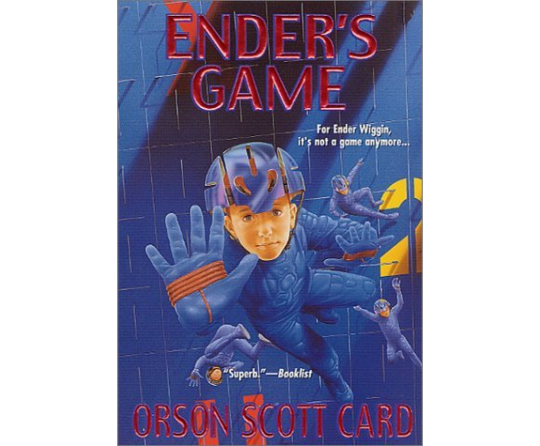
Is Ender Wiggin (pictured above as the little brother from Malcolm in the Middle) guilty of xenocide?
Actually, let's first answer a different, but related, question:
What game does the title "Ender's Game" refer to?
It's not as simple a question as it seems. There are three games that have a prominent role in the plot, all very different from one another.
The obvious answer is the Battle School zero-gravity game, where teams of competitors play glorified laser tag in a big empty cube. In terms of page count, most of the book is dedicated to this game. It's also the game depicted on the cover of the edition above.
Yet this game vanishes during the story's climax, when Ender is given a new game to play, a game he is told is a simulator of spaceship warfare. This "game" turns out to not be a game at all, though; after annihilating the alien homeworld in the final stage, Ender learns that he was actually commanding real ships against real enemies the whole time, and that he just singlehandedly ended the Human-Bugger war forever via total xenocide of the aliens. This is both the final game and the most consequential to the plot, despite the short amount of time it appears.
There's also a third game, a single-player video game Ender plays throughout the story. The game is procedurally generated by an AI to respond to the player's emotional state, and is used as a psychiatric diagnostic for the players. Of the three games, this is the one that probes deepest into Ender's psyche, that most defines him as a person; it's also the final image of the story, as the aliens build a facsimile of its world in reality after psychically reading Ender's mind while he xenocides them.
Because all three games are important, the easiest answer might be that the question doesn't matter, that the story is called Ender's Game not to propose this question at all but simply because the technically more accurate "Ender's Games" would improperly suggest a story about a serial prankster.
Fine. But why does the title use the possessive "Ender's" at all?
He does not own any of these games. He did not create them. He does not facilitate them. All of these games, even the simulator game, predate his use of them as a player, were not designed with him in mind, were intended to train and assess potential commanders for, ostensibly, the hundred years since the last Human-Bugger war.
It's in this question that we get to the crux of what defines Gamer literature.
These games are Ender's games because he dominates them into being about him. He enters a rigidly-defined, rules-based system, and excels so completely that the games warp around his presence. In the Battle School game, the administrators stack the odds against Ender, thereby rendering every other player's presence in the game irrelevant except in their function as challenges for Ender to overcome. The administrators acknowledge this in an argument among themselves:
"The game will be compromised. The comparative standings will become meaningless." [...] "You're getting too close to the game, Anderson. You're forgetting that it is merely a training exercise." "It's also status, identity, purpose, name; all that makes these children who they are comes out of this game. When it becomes known that the game can be manipulated, weighted, cheated, it will undo this whole school. I'm not exaggerating." "I know." "So I hope Ender Wiggin truly is the one, because you'll have degraded the effectiveness of our training method for a long time to come."
In this argument, Anderson views the game the way games have been viewed since antiquity: exercises in acquiring honor and status. This honor is based on the innate fairness inherent to games as rule-based systems, which is why in ancient depictions of sport the chief character is often not a competitor but the host, who acts as referee. In Virgil's Aeneid, for instance, the hero Aeneas hosts a series of funeral games (the games themselves intended as an honor for his dead father). Despite being the principal character of the epic, Aeneas does not compete in these games. Instead, he doles out prizes to each competitor based on the worthiness they display; his fairness marks him symbolically as a wise ruler. The Arthurian tournament is another example, where Arthur as host is the principal character, and the knights (Lancelot, Tristan, etc.) who compete do so primarily to receive honors from him or his queen.
In Ender's Game, it is the antagonistic figure Bonzo Madrid who embodies this classical concept of honor; the word defines him, is repeated constantly ("his Spanish honor"), drives his blistering hatred of Ender, who receives both unfair boons and unfair banes from the game's administrators, who skirts the rules of what is allowed to secure victory. Bonzo is depicted as a stupid, bull-like figure; his honor is ultimately worthless, trivially manipulated by Ender in their final fight.
Meanwhile, it's Ender's disregard for honor, his focus solely on his namesake -- ending, finishing the game, the ends before the means -- that makes him so valuable within the scope of the story. He is "the one," as Anderson puts it, the solipsistically important Gamer, the Only I Play the Game-r, because the game now matters in and of itself, rather than as a social activity. In the Aeneid and in Arthur, the competitors are soldiers, for whom there is a world outside the game. Their games are not a substitute for war but a reprieve from it, and as such they are an activity meant to hold together the unifying fabric of society. The values Anderson espouses (status, identity, purpose, name) are fundamentally more important in this social framework than winning (ending) is.
Ender's game, as the Goosebumps-style blurb on my 20-year-old book fair edition's cover proclaims, is not just a game anymore. Its competitors are also soldiers, but the game is meant to prepare them for war; the spaceship video game is actual war. And as this is a war for the survival of the human race, as Ender is told, there is no need for honor. The othered enemy must be annihilated, without remorse or mercy.
This ethos of the game as fundamentally important for its own sake pervades Gamer literature beyond Ender's Game. In Sword Art Online (which I wrote an essay on here), dying in the game is dying in real life, and as such, only Kirito's ability to beat the game matters. Like Ender, Kirito is immediately disdained by his fellow players as a "cheater" (oh sorry, I mean a "beater") because he possesses inherent advantages due to being a beta player. In an actual game, a game that is only a game, Kirito's cheat powers would render the game pointless. What purpose does Kirito winning serve if he does it with Dual Wielding, an overpowered skill that only he is allowed to have? But when a game has real stakes, when only ability to win matters, it is possible to disregard fairness and see the cheater as heroic.
This notion of the "cheat power," a unique and overpowered ability only the protagonist has, is pervasive in post-SAO Gamer literature. To those for whom games are simply games, such powers can only be infuriating and obnoxious betrayals of the purpose of games; to those for whom games mean more than just games, for whom games have a primacy of importance, these powers are all that matter.
That's the core conceit of Gamer literature: the idea that the Game is life, that winning is, in fact, everything.
What sets Ender's Game apart from Sword Art Online is that it creates the inverted world where the Game matters above all, but then draws back the curtain to reveal the inversion. The Buggers are, in fact, no longer hostile. They are not planning to invade Earth again, as Ender has been told his entire life. The war, for them, is entirely defensive, and Ender is the aggressor. And due to Ender's singleminded focus on Ending, on winning, on disregarding honor and fairness, he ultimately commits the xenocide, erases an entire sentient species from existence. He wins a game he should never have been playing.
The obvious counterargument, the one I imagine everyone who has read this book thought up the moment I posed the question at the beginning of this essay, is that Ender did not know he was committing xenocide. The fact that the combat simulator game was not a game was withheld from him until afterward. Plus, he was a child.
Salient arguments all. Ones the book itself makes, via Ender's commander, Graff, to absolve him of sin at the end. They're probably even correct, in a legal sense (I'm not a legal scholar, don't quote me), and in a moral sense. In real life, it would be difficult to blame a 10-year-old in those circumstances for what he did. But in the thematic framework of Ender's Game the book, these arguments are completely inadequate.
Ender has been playing a fourth game the entire story. And this is the only game he doesn't win.
A game is defined by its system of control and limitation over the behavior of the players. A game has rules. His whole life, Ender has been playing within the rules of the system of control his military commanders place upon him.
Their control extends even before he was born; as a third child in a draconian two-child-only world, his existence is at the behest of the government. Graff confirms this to Ender's parents when he recruits him to Battle School: "Of course we already have your consent, granted in writing at the time conception was confirmed, or he could not have been born. He has been ours since then, if he qualified." Graff frames this control utterly, in terms of possession: "he has been ours." He does not exaggerate. Since Ender was young, he has had a "monitor" implanted in his body so the army could observe him at all times, assess whether he "qualifies"; even the brief moment the monitor is removed is a test. "The final step in your testing was to see what would happen when the monitor came off," Graff explains after Ender passes the test by murdering a 6-year-old. Conditions are set up for Ender, similar to the unfair challenges established in the Battle School game; he is isolated from his peers, denied practice sessions, held in solitary confinement on a remote planetoid. It's all in service of assessing Ender as "the one."
Ender wins this game in the sense that he does, ultimately, become "the one" -- the one Graff and the other military men want, the xenocider of the Buggers. He fails this game in the sense that he does not break it.
The other three games Ender plays, he breaks. Usually by cheating. In the single-player psychiatry game, when presented with a deliberately impossible challenge where a giant gives him two glasses to pick between, Ender cheats and kills the giant. "Cheater, cheater!" the dying giant shouts. In the Battle School game, Ender is ultimately confronted by insurmountable odds: 2 armies against his 1. He cannot outgun his opponent, so he cheats by using most of his troops as a distraction so five soldiers can sneak through the enemy's gate, ending the game. At the school, going through the gate is traditionally seen as a mere formality, something done ceremonially once the enemy team is wiped out (there's that honor again, that ceremony), but it technically causes a win. Even Anderson, the game's administrator, sees this as a breach of the rules when Ender confronts him afterward.
Ender was smiling. "I beat you again, sir," he said. "Nonsense, Ender," Anderson said softly. "Your battle was with Griffin and Tiger." "How stupid do you think I am?" Ender said. Loudly, Anderson said, "After that little maneuver, the rules are being revised to require that all of the enemy's soldiers must be frozen or disabled before the gate can be reversed."
(I include the first part of that quote to indicate that Ender all along knows who he is really playing this game against -- the administrators, the military men who control every facet of his life.)
Ender beats the war simulator game in a similar fashion. Outnumbered this time 1000-to-1, he uses his soldiers as sacrifices to sneak a single bomb onto the alien's homeworld, destroying it and committing his xenocide. Ender himself sees this maneuver as breaking the rules, and in fact falsely believes that if he breaks the rules he will be disqualified, set free from the fourth game: "If I break this rule, they'll never let me be a commander. It would be too dangerous. I'll never have to play a game again. And that is victory." The flaw in his logic comes not from whether he's breaking the rules of the game, but which game he is breaking the rules of. It's not the fourth game, Ender's game, but the war simulator game, simply a sub-game within the confines of the fourth game, a sub-game the fourth game's administrators want him to break, a sub-game that gives Ender the illusion of control by breaking. When Ender tells his administrators about his plan, the response he receives almost taunts him to do it:
"Does the Little Doctor work against a planet?" Mazer's face went rigid. "Ender, the buggers never deliberately attacked a civilian population in either invasion. You decide whether it would be wise to adopt a strategy that would invite reprisals."
(And if it wasn't clear how much the administrators wanted him to do this all along, the moment he does it, they flood the room with cheers.)
Ender wins his games by cheating -- by fighting the rules of the game itself -- and yet he never cheats at the fourth game, the game of his life.
In this fourth game, he always plays by the rules.
In the inverted world of Gamer lit, where games define everything, including life and death, it's a common, even natural progression for the Gamer to finally confront the game's administrator. Sword Art Online ends when Kirito defeats Akihiko Kayaba, the developer. In doing so, Kirito exceeds the confines of the game, not simply by ignoring its rules and coming back to life after he's killed, but by demonstrating mastery against the game's God. Afterward, Sword Art Online truly becomes Kirito's Game, with nobody else able to lay claim to the possessive. Kirito demonstrates this control at the end of the anime by recreating Sword Art Online's world using its source code, completing the transition into a player-administrator.
(Though I wonder, how much of a class reading could one give to this new brand of Gamer lit? If classical games were told from the perspective of the one who controlled them, then is there not something innately anti-establishment in Kirito overcoming the controller? This is the gist of many other death game stories, like The Hunger Games, though none of them may be the most sophisticated takes on the subject, more empty fantasy than anything else.)
Ender never fights or defeats his administrators. He never even tries, other than rare periods of depressive inactivity. He doesn't try even though the option is proposed to him by Dink Meeker, an older student whom Ender respects:
"I'm not going to let the bastards run me, Ender. They've got you pegged, too, and they don't plan to treat you kindly. Look what they've done to you so far." "They haven't done anything except promote me." "And she make you life so easy, neh?" Ender laughed and shook his head. "So maybe you're right." "They think they got you on ice. Don't let them." "But that's what I came for," Ender said. "For them to make me into a tool."
Instead, Ender finds comfort in the control exerted on his life. When sent to Earth on leave, he seeks out a lake that reminds him of living in Battle School.
"I spend a lot of time on the water. When I'm swimming, it's like being weightless. I miss being weightless. Also, when I'm here on the lake, the land slopes up in every direction." "Like living in a bowl." "I've lived in a bowl for four years."
Because of this, Ender never cheats against Graff. He could; Graff states several times that Ender is smarter than him, and the fact that they have Ender fighting the war instead of Graff is proof he believes it. But Ender never considers it. He never considers gaming the system of his life.
If Gamer literature emphasizes the inversion of the world order, where games supersede reality in importance (and, as in Sword Art Online, only through this inverted order is one able to claim real power by being a Gamer), then Ender's Game acknowledges both sides of the inversion. For Ender, the games he plays are not simply games anymore. The psychology game, the Battle School game, the war simulator game; all of these he must win at all costs, even if it requires disrespecting the foundational purpose of these games. But his real life? Ender wants that to be a game, craves it to be a game, can't live unless the walls slope up around him like a bowl, can't stand it unless there is a system of control around him. He does what Graff tells him, even though he recognizes immediately that Graff is not his friend, that Graff is the one isolating him from others, rigging things against him. He does what Graff tells him all the way up to and including xenocide, because Ender cannot tell game from real life. That's the core deception at the end: Ender is playing a game that's actually real and he doesn't know it -- or refuses to acknowledge it, since nobody has ever tricked the genius Ender before this point.
Actually, that's not true. They tricked him twice before. Ender twice attacks his peers physically, with brutal violence. The administrators conceal from him that he murdered both his foes; he simply thinks he hurt them. The only way to trick Ender is to do so in a way that insulates him from the consequences of his actions. The only way he will allow himself to be tricked.
So, is Ender guilty of xenocide?
Under it all, Ender believes he is.
The dying Buggers, after reading Ender's mind, recreate the psychology game in the real world. The story ends when Ender finds this recreation, yet another blurring of the lines between game and reality.
The psychology game is different from the other games Ender plays, because nobody expects him to win it. Its purpose is not to be won, simply to assess his mental health. Yet Ender approaches it like the other games, cheats at it and systematically kills all his enemies until he reaches a place called The End of the World. (Another End for Ender.) His drive to win, to dominate, does not come solely from the pressures of the system around him, but from deep within himself, which is what Ender fears the most. But it is here, at The End of the World, where Ender finds atonement, both in the game and in the game-made-real. In the game, he kisses his opponent instead of killing them, and reaches a resolution he is happy with. He stops playing the game after doing this, though the game seems to continue (when an administrator asks him why he stopped playing it, he says "I beat it"; the administrator tells him the game cannot be beaten). It is through this act of love that Ender can escape the game-like system of control that puppeteers him no matter how smart and clever he is or thinks he is.
In the game-made-real, Ender finds his atonement in the same place, The End of the World. The Buggers left for him here, in this place that they (reading his mind) understood as the location of his mercy and compassion, an egg that can repopulate their species. Through this egg, Ender is given the chance to undo his xenocide. But that chance is also contingent on what The End of the World means to Ender, an end to the game, not simply the games he plays but the fourth game, the game of his life. Ender's Game.
775 notes
·
View notes
Text
Lately, I've been thinking about the effect of real-world time on perception of media. Or, wait, let me start from the beginning.
When I was 11, I read the book Ender's Game for some school assignment or another. I don't remember ever considering Ender a relatable character, but certainly my understanding of the events was shaped by being of an age to see the protagonist not so much as a young child but as someone of my peer group, someone who could have been slotted amongst my classmates without anybody batting an eye.
Over a decade later, I read the sequel, Speaker for the Dead; it takes place many years later, when Ender is in his thirties, and my feelings about the in-universe time skip were undeniably shaped by the real life time gap between my reading of the novels. Reading the first book back then and then the second book now created a feeling where it's almost like, I'm browsing the facebook page of someone I had known in middle school but lost contact with, checking up on how they're doing today. The real-time factor caused me to perceive it less like a timeskip, and more like a reunion - the feelings were closer to "oh wow, that's my boy! I haven't seen him in years! Wonder what he's up to?" Which in turn gave me a better position to appreciate the parts of the narrative about him struggling to find a place in his adulthood than I would have been had I perceived it more strictly as a quick skip from 11 to 20 to 36.
While musing about this, I considered a VN I played a few years back, which took place over three in-game days - except at the end of one in-game day, the game would lock you out from progressing for 24 hours real time. So that as the in-game investigator protagonist was ruminating on the information that had been discovered that day, the player would be forced to do the same. In this example, by forcing the player to experience the same timeframe as the in-game characters, the sense of it being an in-depth and extensive investigation increases, even though without the forced pauses the game would be short enough to blow through in a handful of hours real-time.
Which brings to mind how time effects things in long-running serial works. It's well known that an audience which watches an episode or reads a chapter week by week has a very different experience than one binging through whole seasons or volumes at a time, but I wonder if the real time relative to the in-universe time makes that effect stand out more? Fight scenes, for instance, have been known to take up several chapters in certain manga or webnovels. What does it do to the reader's perception, if from their point a view a fight takes a whole month, while for the characters they read about it's only been a couple hours? Readers might feel that the situation is more stressful, since the pressure of the fight has been ongoing for a long time for them, while in-universe it was a rough afternoon but no more than that. Contrastingly, when a series skips ahead or otherwise has long periods of time for characters that feel short for readers, it can feel like no time has passed and everything is still the same, unless the author really stresses the differences in world-state that occurred offscreen. Because the reader hasn't changed at all.
No conclusion here exactly, I just think it's interesting how often an audience's response to a work, the emotions felt, are more closely tied to their real-life timescale, something almost completely out of the author's control, as opposed to in-universe time, which can be intentionally shifted or played with for the sake of the narrative.
685 notes
·
View notes
Text
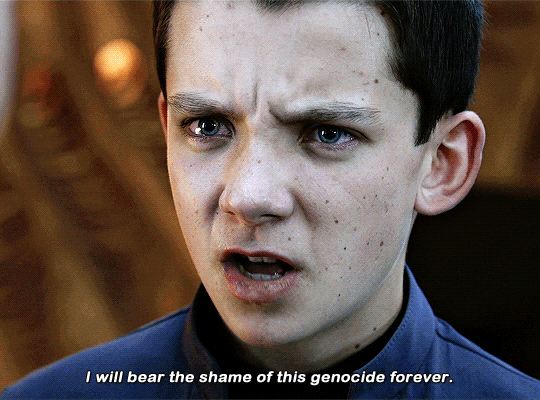
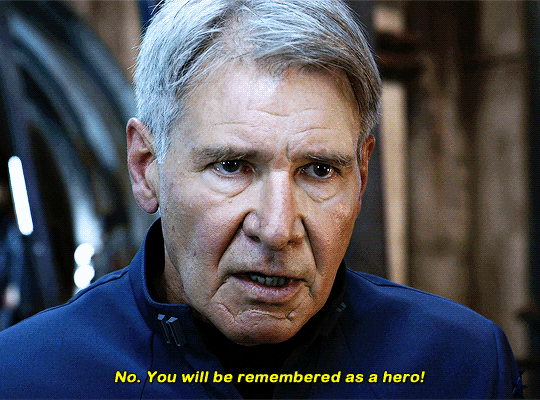
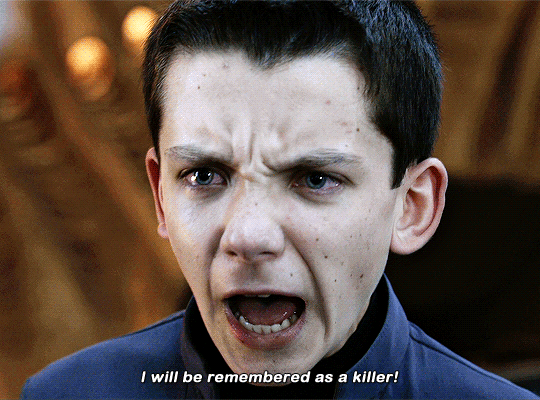
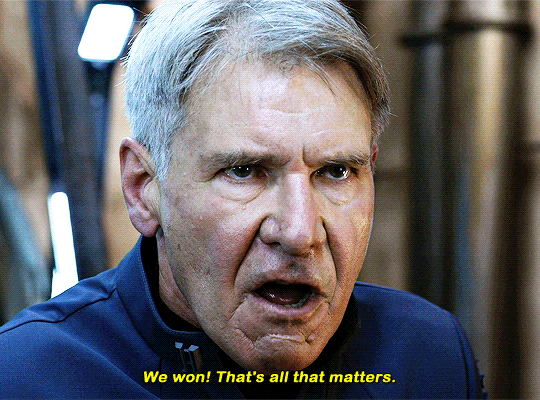
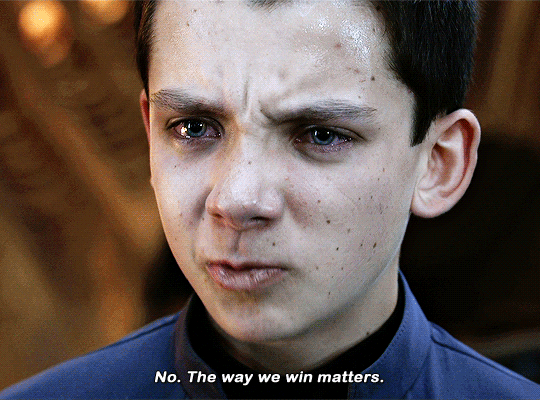
Ender's Game November 1, 2013 | dir. Gavin Hood
#ender's game#filmedit#scifiedit#asa butterfield#harrison ford#nikolatexla#i love this movie so much
85 notes
·
View notes
Text

Oscar Chichoni, cover art for Ender’s Game by Orson Scott Card.
#images#oscar chichoni#ender's game#I would love to own a copy of ender's game with this as the cover#it's one of my favorite sci-fi novels
92 notes
·
View notes
Text

i know im not an ender's game blog but im really really normal about that book (and bean's pov version) so anyway here you go
#ender's game#i dont like the last two books in ender's series tho#i haven't finished bean's series so i cant say about that one#i was trying to plow through ender's series but after months i finally surrendered to Children of the Mind#sorry but the end of ender's life is so stupid i can't aksjndfkwjenskfdj#so im rereading bean's first book rn and once i finish it im gonna go ahead and read the rest of his shadow series#and then i'll read the other “oneshot” ender books after#idk if im gonna read the formic wars#i've heard they're hit or miss#my bf really liked them tho so maybe i'll give them a shot#not dp related
79 notes
·
View notes
Text



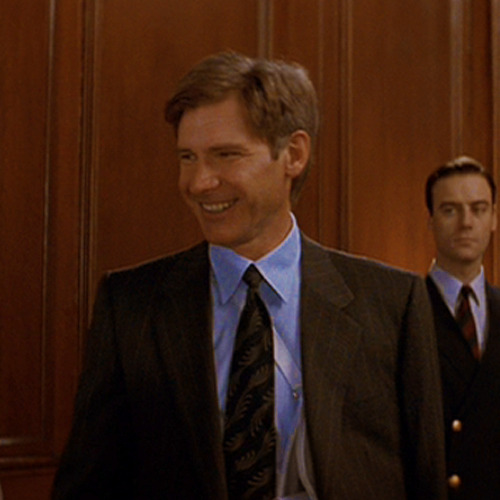











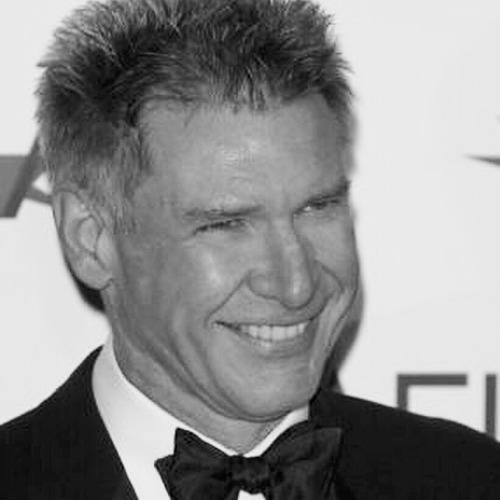


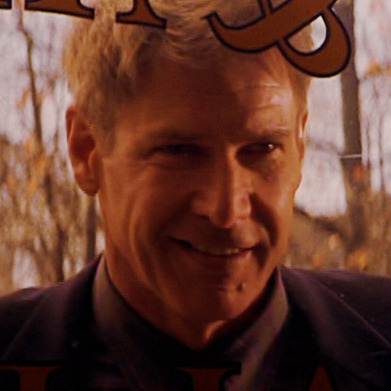











Appreciation post of Harrison Ford's smile (part 6) 🥰💕
#harrison ford#the frisco kid#jack ryan#patriot games#the fugitive#sabrina#the devil's own#six days seven nights#random hearts#crossing over#extraordinary measures#42#paranoia#ender's game#the call of the wild#oh man#i'm in love 😍😍😍#*sigh*
99 notes
·
View notes
Text
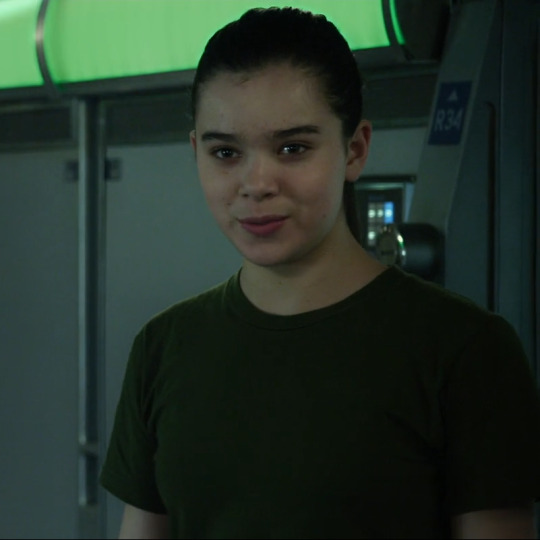
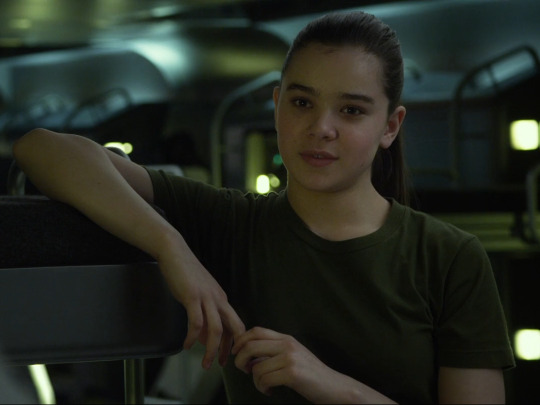
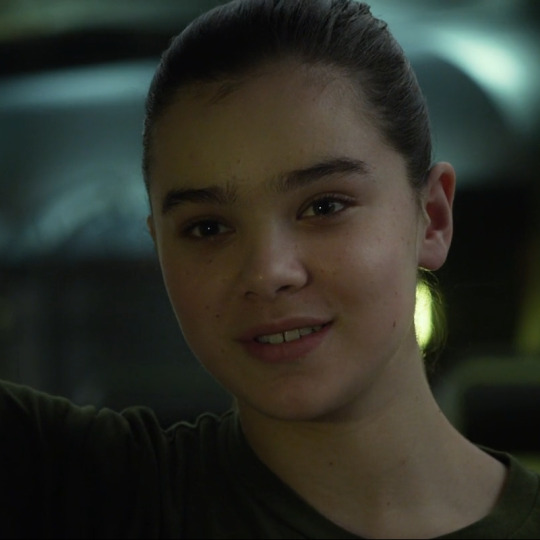
Hailee Steinfeld as Petra Arkanian in Ender's Game (2013)
61 notes
·
View notes
Text
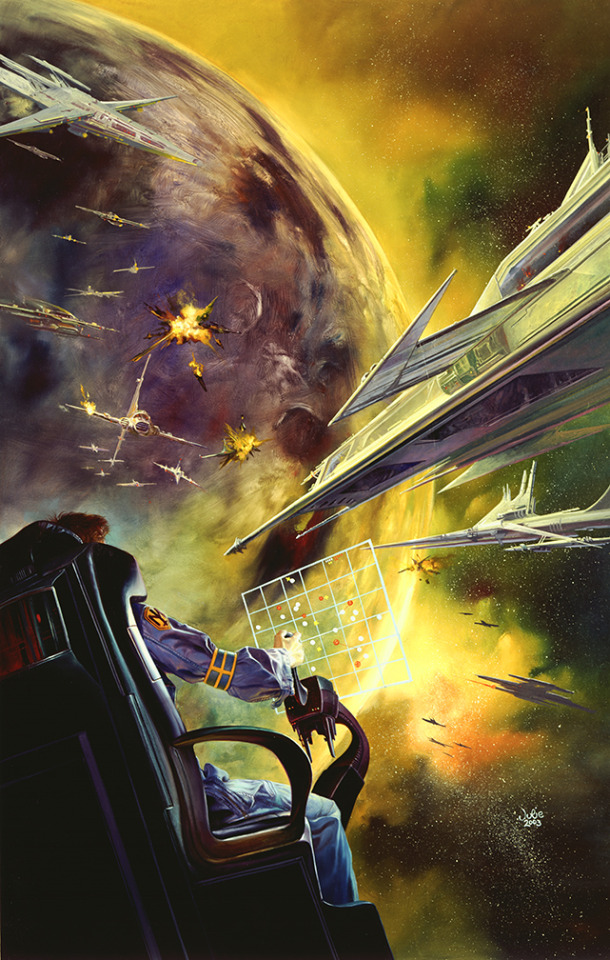
Ender's Game by Julie Bell
160 notes
·
View notes
Text
They should have been queer Tournament - Round 1

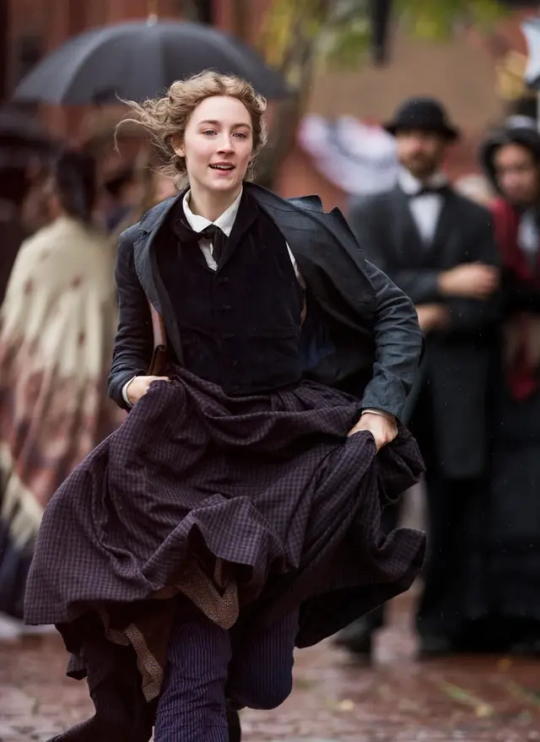
Fanart by @macbethz Reblog and like it here
Disclaimer: This tournament is based on submissions! Please respect all identities, characters and fandoms! Hate will get you blocked instantly!
Why Ender should have been queer: He should have been pan because of his queer experiences within the book as well as his overwhelming love and empathy for everyone and everything.
Why Jo should have been queer: Technically her sexuality isn't specified, but aroace Jo March lives in my head rent free.
#jo march#little women#louisa may alcott#they should have been queer tournament#ender wiggin#ender's game#orson scott card
15 notes
·
View notes
Text
I picked 1-2 things from all the authors/directors I could think of, but let me know if I've forgotten something interesting. I was thinking about this topic because this year's bestseller Fourth Wing was apparently written by an ex-Mormon who now loves coffee and smut, which I think is pretty funny.
#battlestar galactica#the swan princess#twilight#mistborn#princess academy#ender's game#dathomir#anastasia#the land before time#napoleon dynamite#austenland#the wheel of time
188 notes
·
View notes
Text
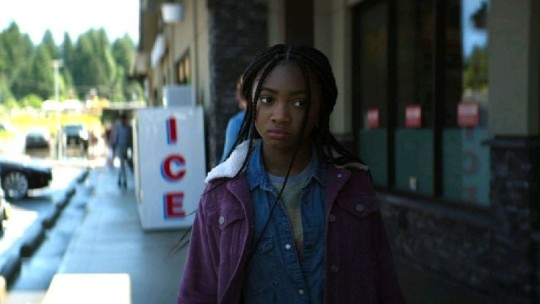
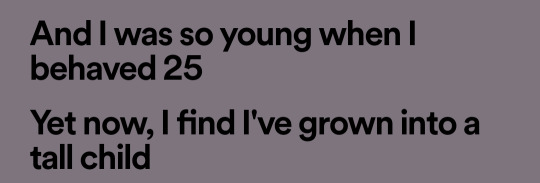
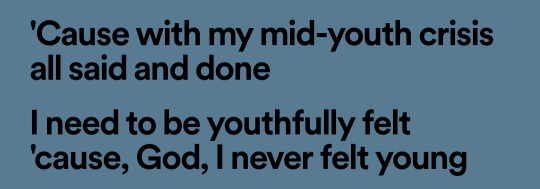
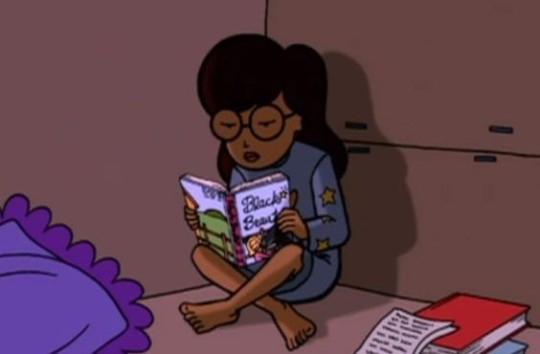


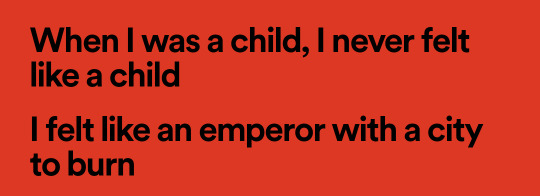
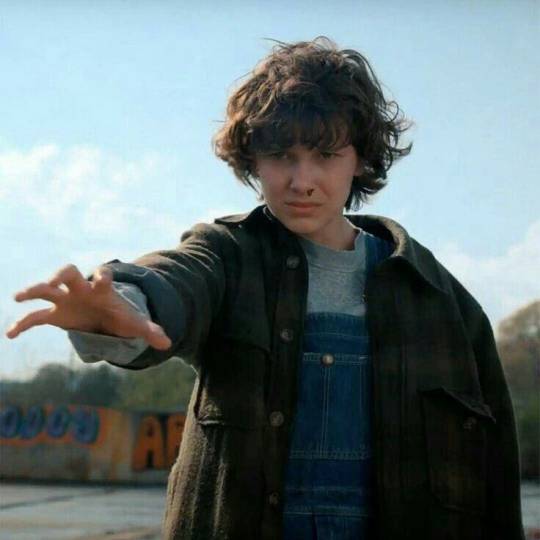
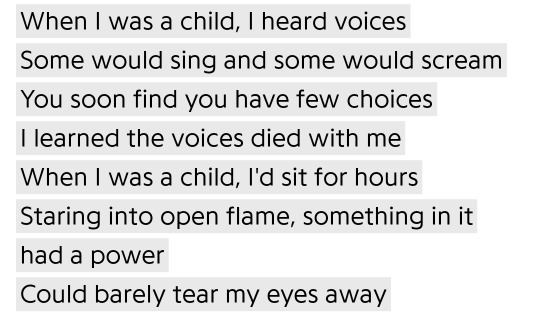

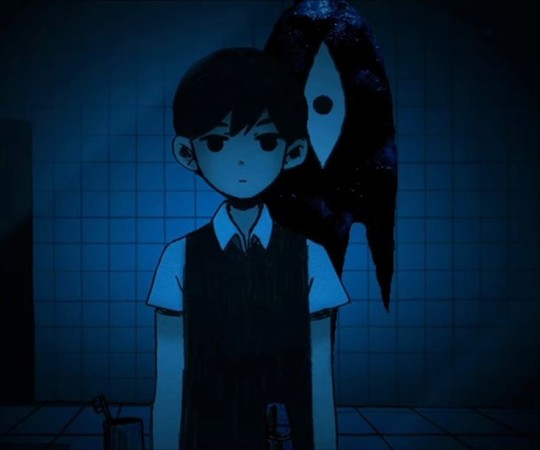
god, i never felt young
percy jackson and the olympians (2023) / first love/late spring - mitski / jackie and wilson - hozier / daria (1997) ender's game - orson scott card / daisy jones & the six (2023) / caesar on a tv screen - the last dinner party / stranger things (2016) / arsonist's lullaby - hozier / the picture of dorian gray - oscar wilde / omori
#web weaving#percy jackon and the olympians#mitski#hozier#ender's game#daisy jones and the six#the last dinner party#daria#oscar wilde#omori#stranger things
118 notes
·
View notes
Note
do you think your thesis on Ender's various games impacts your reading the siblings sideplot? or are they representing something entirely different?
I talked about this a little in a response to a response to the essay (it's in the reblogs), but Peter and Valentine's plot is a foil to Ender's. Peter and Valentine were rejected by the military's game of control, and being outside it are capable of, essentially, taking over the world, even as children. On the face of it, it's a ridiculous plotline, but in the world of Ender's Game, it's to be expected; the Wiggin children are preternatural geniuses and they do not lose. The juxtaposition between Ender and Peter is especially highlighted at the end of the story, when Valentine and Ender remark how ironic it is that the sadistic Peter saved millions of lives by bringing about peace accords, while Ender killed billions by following orders. I suppose you can interpret the subplot two ways in terms of Ender's culpability: Either it shows that Ender was, in fact, intelligent enough to take over the broader system of control if he wanted to, or it shows that it was specifically the military's control over him, the distracting games they sent his way where he could win and conquer and not question the larger game, that prevented Ender from achieving something actually good.
Another interesting note is that the military rejected Peter because he was too cruel. This detail is given very early on, but when revisited in retrospect while considering what exactly the military wanted Ender to do (namely, complete and utter genocide without mercy), it's odd that Peter's cruelty was seen as grounds for disqualification at all. The military doesn't even care that Ender kills a few other kids on his way to the top; actually, they encourage it by putting him in a situation with Bonzo where he is forced to resort to violence. Ender comments on this throughout the story himself: They want me to be Peter, he thinks, they're trying to make me be Peter, I really am Peter after all (he sees Peter in the mirror in the psychology game).
The military brass and Rackham mention that Ender's empathy in understanding the buggers was essential to his ability to destroy them, which is true, but Peter also displays the ability to understand his adversaries during his blogging rise to global control -- his entire plot hinges on Locke and Demosthenes manipulating public opinion exactly the way he wants, and it works. Perhaps we can take this explanation at face value, assume Ender's superior empathy to Peter was in fact necessary to his success, but there's another interpretation I like, which is that Ender's compassion makes him easier to control. Both times Ender puts up any resistance to the system of control, not by active dissent but by simply shutting down, the military whips him back into compliance by parading Valentine in front of him, as if to say "Look who you have to save. You have to do what we say to save her." Is Peter's sociopathic cruelty really disqualifying him from beating the buggers, or does it just make him harder for the military to control?
24 notes
·
View notes
Text
"ender wiggin is ontologically evil and the real villain of ender's game" ender is like. eleven years old. neurodivergent and a minor in the most literal sense of the term.
#the real villain of enders game is osc btw#fuck that guy#ender's game#ender wiggin#that is a whole ass child#pigeon.txt#shitpost
122 notes
·
View notes
Text

"bug hot 😳😳😳"
#formic queen#ender's game#smash or pass#tumblr polls#sorry i couldnt enlarge the gif so its like. 2 pixels tall
39 notes
·
View notes
Text
I think in a modern Ender's Game Locke and Demosthenes would have to be political commentary v-tubers
15 notes
·
View notes